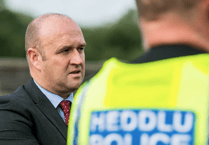A beef and sheep farming family have outlined their concerns for the industry when they welcomed Plaid Cymru MP Ben Lake and Elin Jones MS to their farm on the outskirts of Tregaron.
Garnwen farm, a fourth-generation holding, is home to Peter, Gill and Emily Jones.
The family keep 250 ewes, including 80 pedigree North Country Cheviots, 10 Charmoise Hill sheep and 160 commercial ewes, as well as 20 suckler cows including pedigree Beef Shorthorns on 140 acres, including 20 rented.
A traditional family farm with a low input approach, the cattle are in a high health scheme to ensure no disease is brought onto the farm and herd. The farm has strong sustainability aims, using organic lays including chicory and plantain, which acts as a natural wormer for sheep.
Through such grazing practises the family have reduced their antibiotic use on farm and found it to be a more sustainable way of getting their lambs ready for market, reducing supplementary feeding. Fertiliser is also being used sparingly across the holding.
Union officials and politicians enjoyed a presentation from Emily on the farm business and heard the families concerns about the Sustainable Farming Scheme proposals, as well as the Welsh Government’s approach to eradicating diseases such as bovine TB and sheep scab.
Farmers’ Union of Wales officials also highlighted concerns around Wales’ Rural Affairs budget.
Speaking after the visit, FUW president Ian Rickman said: “A huge focus for us ahead of the next UK General Election is Wales’ rural affairs budget and we raised some concerns around that with Ben Lake and Elin Jones.
“We know that by 2025, Wales will have received around £228 million less in funding for agriculture and rural development than could have been expected had the UK remained within the EU.
“This doesn’t include the recent announcement of the £37m which could be lost from the rural affairs budget at a time of major transition and pressures for farmers.
“What we are seeing is that with the conclusion of Glastir and the implementation of the interim Habitat Wales Scheme, now is the first time a significant number of farmers throughout Wales will feel the impact of Brexit and budget cuts at the farm gate.
“Funding received from the UK Treasury is also no longer ring-fenced for direct support for farmers and specific rural development objectives, nor regulated by strict spending criteria as it used to be under EU legislation.
“With this in mind, it is absolutely essential that the Sustainable Farming Scheme is sufficiently resourced and Welsh farmers are properly rewarded for helping to meet Welsh Government targets.”
Mr Rickman also thanked the Jones family for the warm welcome to the farm, adding: “Farming families like Emily’s are the backbone of our rural economies, keeping our way of life and culture alive and are leading the way in sustainable food production. It is crucial we don’t lose farming families like the Jones’ from our lands.”




